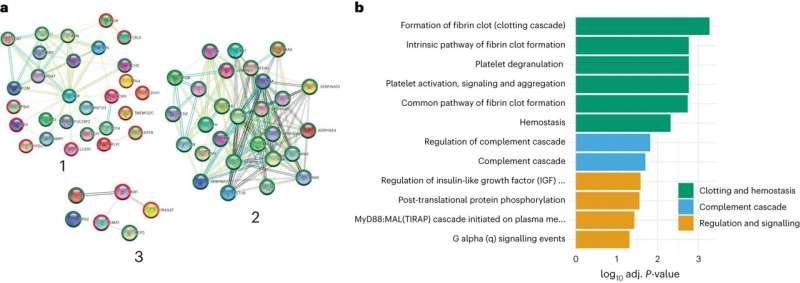This article has been reviewed according to Science X's editorial process and policies. Editors have highlighted the following attributes while ensuring the content's credibility:
fact-checked
peer-reviewed publication
trusted source
proofread
Researchers identify plasma biomarkers of mental health risk in adolescents

Researchers at the University of Eastern Finland have identified plasma protein-based biomarkers capable of identifying adolescents at risk of developing mental health issues. The results were published in Nature Mental Health. A Research Briefing on this work was published in the same journal issue.
An estimated 10% to 20% of adolescents struggle with mental health conditions, with the majority remaining undiagnosed and untreated. New, early indicators of mental health problems are urgently needed, as they could revolutionize early detection and, in the future, the prevention of mental health problems in young individuals.
In the study carried out by the research group of Professor Katja Kanninen, the researchers used self-reported Strengths and Difficulties Questionnaire (SDQ) scores to evaluate mental health risk in participants aged between 11 and 16 years. Blood sample analyses showed that 58 proteins were significantly associated with the SDQ score.
Bioinformatic analyses were used to identify the biological processes and pathways linked with the identified plasma protein biomarker candidates. Key enriched pathways related to these proteins included immune responses, blood coagulation, neurogenesis, and neuronal degeneration. The study employed a novel symbolic regression algorithm to create predictive models that best separate low and high SDQ score groups.
According to Kanninen, plasma biomarker studies in mental disorders are an emerging field.
"Alterations in plasma proteins have been previously associated with various mental health disorders, such as depression, schizophrenia, psychotic disorders, and bipolar disorders. Our study supports these earlier findings and further revealed that specific plasma protein alterations could indicate a high risk for mental dysfunction in adolescents," Kanninen notes.
According to the researchers, this pilot study will be followed by more specific investigations of the potential biomarkers for identification of individuals at risk of mental health problems, opening a new avenue for advancements in adolescent mental health care.
More information: Izaque de Sousa Maciel et al, Plasma proteomics discovery of mental health risk biomarkers in adolescents, Nature Mental Health (2023). DOI: 10.1038/s44220-023-00103-2
Exploring plasma biomarker candidates for mental health risk assessment in adolescents, Nature Mental Health (2023). DOI: 10.1038/s44220-023-00104-1




















